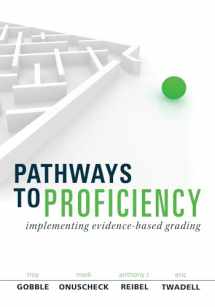
Pathways to Proficiency: Implementing Evidence-Based Grading - clarify student expectations and collect visible evidence of student learning
Book details
Summary
Description
Challenge traditional grading practices and adopt a new, more effective grading model for students, which will close the gaps in student achievement and content mastery. This book provides the pathway for implementing evidence-based grading practices in schools through a straightforward, five-phase creative model: (1) preparation, (2) incubation, (3) insight, (4) evaluation, and (5) elaboration. Readers will follow a hypothetical curriculum team's journey through each phase of this process.
Benefits
- Confront ineffective grading practices and then overcome traditional biases to apply better grading practices.
- Reflect on the effectiveness of revisions and improve newly revised grading methods.
- Give students meaningful information about their progress toward learning targets and expectations.
- Identify the concepts and perspectives to which curriculum team members must commit, to successfully adopt evidence-based grading practices.
- Discover the important relationships between learning targets and grading, feedback and instruction, assessment and grading, and gradebooks and learning.
Contents
About the Author
Introduction
1. Preparation
2. Incubation
3. Insight
4. Evaluation
5. Elaboration
Epilogue
References and Resources
Index


We would LOVE it if you could help us and other readers by reviewing the book
Book review



